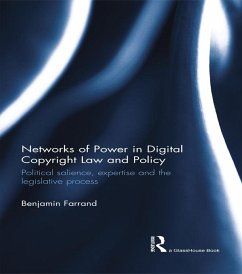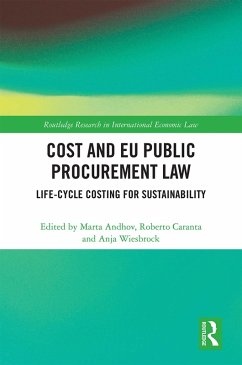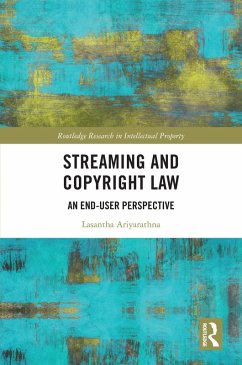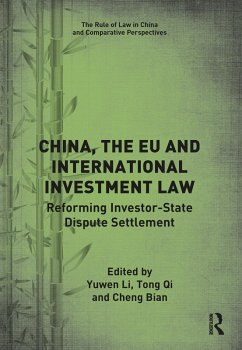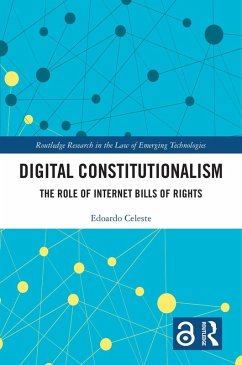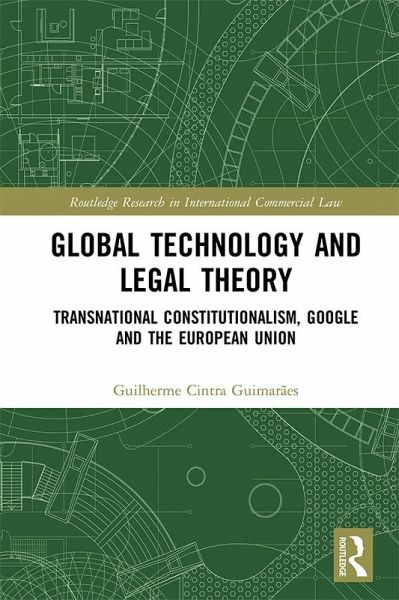
Global Technology and Legal Theory (eBook, ePUB)
Transnational Constitutionalism, Google and the European Union
Versandkostenfrei!
Sofort per Download lieferbar
41,95 €
inkl. MwSt.
Weitere Ausgaben:

PAYBACK Punkte
21 °P sammeln!
The rise and spread of the Internet has accelerated the global flows of money,technology and information that are increasingly perceived as a challenge to thetraditional regulatory powers of nation states and the effectiveness of their constitutions.The acceleration of these flows poses new legal and political problemsto their regulation and control, as shown by recent conflicts between Google andthe European Union (EU).This book investigates the transnational constitutional dimension of recentconflicts between Google and the EU in the areas of competition, taxation andhuman rights. More than ...
The rise and spread of the Internet has accelerated the global flows of money,
technology and information that are increasingly perceived as a challenge to the
traditional regulatory powers of nation states and the effectiveness of their constitutions.
The acceleration of these flows poses new legal and political problems
to their regulation and control, as shown by recent conflicts between Google and
the European Union (EU).
This book investigates the transnational constitutional dimension of recent
conflicts between Google and the EU in the areas of competition, taxation and
human rights. More than a simple case study, it explores how the new conflicts
originating from the worldwide expansion of the Internet economy are being dealt
with by the institutional mechanisms available at the European level. The analysis
of these conflicts exposes the tensions and contradictions between, on the one
hand, legal and political systems that are limited by territory, and, on the other
hand, the inherently global functioning of the Internet. The EU's promising
initiatives to extend the protection of privacy in cyberspace set the stage for a
broader dialogue on constitutional problems related to the enforcement of fundamental
rights and the legitimate exercise of power that are common to different
legal orders of world society. Nevertheless, the different ways of dealing with the
competition and fiscal aspects of the conflicts with Google also indicate the same
limits that are generally attributed to the very project of European integration,
showing that the constitutionalization of the economy tends to outpace the constitutionalization
of politics.
Providing a detailed account of the unfolding of these conflicts, and their wider
consequences to the future of the Internet, this book will appeal to scholars
working in EU law, international law and constitutional law, as well as those in the
fields of political science and sociology.
technology and information that are increasingly perceived as a challenge to the
traditional regulatory powers of nation states and the effectiveness of their constitutions.
The acceleration of these flows poses new legal and political problems
to their regulation and control, as shown by recent conflicts between Google and
the European Union (EU).
This book investigates the transnational constitutional dimension of recent
conflicts between Google and the EU in the areas of competition, taxation and
human rights. More than a simple case study, it explores how the new conflicts
originating from the worldwide expansion of the Internet economy are being dealt
with by the institutional mechanisms available at the European level. The analysis
of these conflicts exposes the tensions and contradictions between, on the one
hand, legal and political systems that are limited by territory, and, on the other
hand, the inherently global functioning of the Internet. The EU's promising
initiatives to extend the protection of privacy in cyberspace set the stage for a
broader dialogue on constitutional problems related to the enforcement of fundamental
rights and the legitimate exercise of power that are common to different
legal orders of world society. Nevertheless, the different ways of dealing with the
competition and fiscal aspects of the conflicts with Google also indicate the same
limits that are generally attributed to the very project of European integration,
showing that the constitutionalization of the economy tends to outpace the constitutionalization
of politics.
Providing a detailed account of the unfolding of these conflicts, and their wider
consequences to the future of the Internet, this book will appeal to scholars
working in EU law, international law and constitutional law, as well as those in the
fields of political science and sociology.
Dieser Download kann aus rechtlichen Gründen nur mit Rechnungsadresse in A, B, BG, CY, CZ, D, DK, EW, E, FIN, F, GR, HR, H, IRL, I, LT, L, LR, M, NL, PL, P, R, S, SLO, SK ausgeliefert werden.





